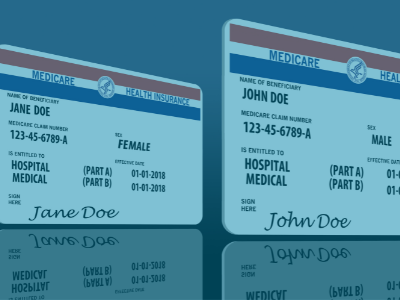Simplify Enrollment, Minimize Treatment Disruptions with the CareMetx Medicare Resource Guide
Today, nearly 64 million Americans rely on Medicare and Medicare Advantage plans for their healthcare coverage. What this means is that every year,...
Shift the focus to improving patient experience, care, and practice success
Empower your practice to focus on patient care with streamlined administrative solutions
Get in touch with our team for provider client support
Ensure patients can start and stay on the therapies they need by removing obstacles at every step of their journey
Solution
Resources
Our focus has been deeply rooted in one common theme from the beginning — that patients are the priority
Keep up to date on news and announcements at CareMetx
Join our team
Meet with us
3 min read
Michael Tidd : Apr 21, 2022 8:15:00 AM

More than 18% of the US population is covered in some form by Medicare. For more than 23 million Americans, it’s through the Medicare Advantage plan; for almost 38 million others, it’s via standard Medicare. As these figures continue to rise, it is critical that we ensure these millions of patients’ Medicare claims are processed quickly and accurately. However, access to medications for these patients often comes to a grinding halt, simply because members are unknowingly providing ID numbers that became invalid as of 2020. This simple administrative hiccup is creating data-related obstacles that can greatly jeopardize the process of getting patients access to their medication in a timely manner. Thankfully, the right technology can help.
Medicare Beneficiary Identification Has Changed
A 2015 law mandated that social-security-specific Medicare IDs be replaced with a randomly generated 11-character ID, one that doesn’t rely on the SSN or other sensitive patient information. As of January 1, 2020, that old number became obsolete, replaced with the new Medicare Beneficiary Identification (MBI). Here’s what the new MBI format involves:
Despite this federal mandate, adoption of this new MBI has not been smooth or widespread. As of April 2022, benefit verification submissions using the old SSN-based Medicare ID still come in through the CareMetx hub every day. For one client, thousands of the Medicare records we reviewed while preparing for the 2022 reverification push in January included this antiquated number.
Whether it’s because patients hold on to their old ID cards, a physician’s office staff doesn’t know about the new MBI, or stale data is floating around in a system, these outdated, invalid IDs persist. But Medicare no longer accepts claims or benefits requests with the old IDs, creating a stumbling block for the largest single segment of insured Americans.
CareMetx is at the forefront of providing technology-based solutions to address this problem, working closely with our clients since the new MBI went into effect, to ensure it doesn’t negatively impact patients.
Whether patients have the old SSN-based Medicare ID, or just the SSN, our highly skilled teams can produce the new MBI on behalf of the patient to ensure fast, accurate benefit verifications and claims filing. The ability to produce this ID code is critically important, because benefits determinations are far more accurate when that new MBI is available.
The Specific Problem of Medicare Dashes
As with many other insurer ID cards, Medicare places dashes between certain segments of the member ID. When providers or payers ask patients to input their ID number into a form, most type it exactly as it appears on the card, including the dashes.
Surprisingly, if you submit a patient’s MBI to Medicare with the dashes included, you’ll get an error, because Medicare cannot match the ID. Unfortunately, many employees in physician’s offices and at national payers don’t know that’s the case, and they aren’t instructed otherwise. Even the clearinghouses connecting to Medicare to provide electronic data interchange (EDI) transactions don't strip out the dashes or otherwise perform any intelligent normalization of the data to avoid this problem.
But CareMetx does! In fact, we’ve been doing it since 2018—streamlining the data exchange between a physician’s office and the national payer database, preventing easy-to-predict data issues due to problems like dashes between numerals, adding intelligence and value to every transaction, and getting the best data possible back into providers’ hands. And while our current efforts go a long way toward removing the hurdles associated with the MBI, there’s still an exciting opportunity to do more. It’s technically possible to receive the old Medicare Health Insurance Claim Number (HICN), obtain the MBI mid-transaction, and return the current, correct MBI and benefit information to clients.
Separating Medicare from Medicare Advantage
The automated intelligence that CareMetx provides around Medicare benefits doesn’t end with the MBI. Another issue that can keep Medicare benefits from being processed smoothly is the fact that many patients who specifically have a “Medicare Advantage” plan give providers their original, standard “Medicare” card instead. That can prove disastrous, since that patient then may only be informed of Medicare benefits, even if that patient is covered under Medicare Advantage.
Through our innovative solution, CareMetx can identify when a patient submitted to us with standard Medicare specifically has that Medicare Advantage plan. That way, we return a result that includes the correct Medicare Advantage payer. Additionally we include other data points we can ascertain, such as the patient’s plan, effective date, or member ID. We also flag the result with an error so our clients can review it and understand what’s going on.
Medicare and Medicare Advantage are a huge part of the US insurance landscape, so it’s essential that we can get the most from each members’ data, and help providers bill correctly for services. As a leader in promoting radical efficiency in the healthcare system and providing the hub services technology that improves patient access, affordability and improved adherence, CareMetx will continue to leverage intelligent solutions to ensure data issues don’t stand in the way of ensuring smooth, accurate Medicare and Medicare Advantage benefit verification and claims filing.

Today, nearly 64 million Americans rely on Medicare and Medicare Advantage plans for their healthcare coverage. What this means is that every year,...

Reducing time to therapy is a critical goal for pharmaceutical manufacturers and the patients who rely on their specialty drugs. The sooner the...

More than 65 million Americans depend on Medicare and Medicare Advantage plans for their healthcare coverage—a number that underscores just how vital...